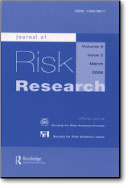Fukushima: Probing the Analytical and Epistemological Limits of Risk Analysis

Autor(en): Jonas Hagmann
Journaltitel: Journal of Risk Research
Reviewed:
Band: 15
Ausgabe: 7
Seiten: 801-815
Verlag(e): Routledge
Publikationsjahr: 2012
